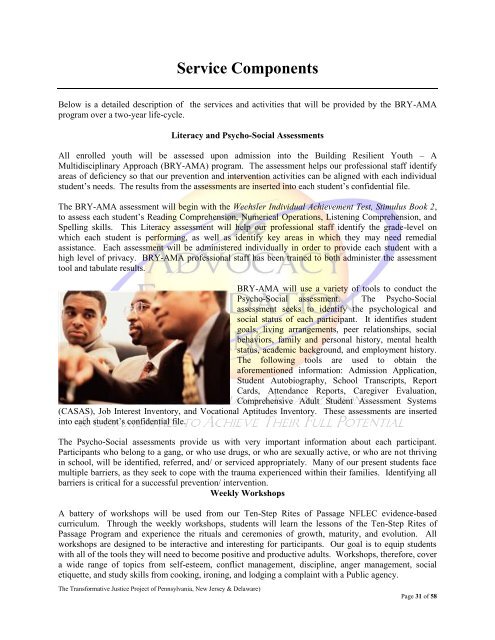The Transformative Justice Project of Pennsylvania, New Jersey & Delaware
The Transformative Justice Project of Pennsylvania, New Jersey & Delaware
The Transformative Justice Project of Pennsylvania, New Jersey & Delaware
You also want an ePaper? Increase the reach of your titles
YUMPU automatically turns print PDFs into web optimized ePapers that Google loves.
Service Components<br />
Below is a detailed description <strong>of</strong> the services and activities that will be provided by the BRY-AMA<br />
program over a two-year life-cycle.<br />
Literacy and Psycho-Social Assessments<br />
All enrolled youth will be assessed upon admission into the Building Resilient Youth – A<br />
Multidisciplinary Approach (BRY-AMA) program. <strong>The</strong> assessment helps our pr<strong>of</strong>essional staff identify<br />
areas <strong>of</strong> deficiency so that our prevention and intervention activities can be aligned with each individual<br />
student’s needs. <strong>The</strong> results from the assessments are inserted into each student’s confidential file.<br />
<strong>The</strong> BRY-AMA assessment will begin with the Wechsler Individual Achievement Test, Stimulus Book 2,<br />
to assess each student’s Reading Comprehension, Numerical Operations, Listening Comprehension, and<br />
Spelling skills. This Literacy assessment will help our pr<strong>of</strong>essional staff identify the grade-level on<br />
which each student is performing, as well as identify key areas in which they may need remedial<br />
assistance. Each assessment will be administered individually in order to provide each student with a<br />
high level <strong>of</strong> privacy. BRY-AMA pr<strong>of</strong>essional staff has been trained to both administer the assessment<br />
tool and tabulate results.<br />
BRY-AMA will use a variety <strong>of</strong> tools to conduct the<br />
Psycho-Social assessment. <strong>The</strong> Psycho-Social<br />
assessment seeks to identify the psychological and<br />
social status <strong>of</strong> each participant. It identifies student<br />
goals, living arrangements, peer relationships, social<br />
behaviors, family and personal history, mental health<br />
status, academic background, and employment history.<br />
<strong>The</strong> following tools are used to obtain the<br />
aforementioned information: Admission Application,<br />
Student Autobiography, School Transcripts, Report<br />
Cards, Attendance Reports, Caregiver Evaluation,<br />
Comprehensive Adult Student Assessment Systems<br />
(CASAS), Job Interest Inventory, and Vocational Aptitudes Inventory. <strong>The</strong>se assessments are inserted<br />
into each student’s confidential file.<br />
<strong>The</strong> Psycho-Social assessments provide us with very important information about each participant.<br />
Participants who belong to a gang, or who use drugs, or who are sexually active, or who are not thriving<br />
in school, will be identified, referred, and/ or serviced appropriately. Many <strong>of</strong> our present students face<br />
multiple barriers, as they seek to cope with the trauma experienced within their families. Identifying all<br />
barriers is critical for a successful prevention/ intervention.<br />
Weekly Workshops<br />
A battery <strong>of</strong> workshops will be used from our Ten-Step Rites <strong>of</strong> Passage NFLEC evidence-based<br />
curriculum. Through the weekly workshops, students will learn the lessons <strong>of</strong> the Ten-Step Rites <strong>of</strong><br />
Passage Program and experience the rituals and ceremonies <strong>of</strong> growth, maturity, and evolution. All<br />
workshops are designed to be interactive and interesting for participants. Our goal is to equip students<br />
with all <strong>of</strong> the tools they will need to become positive and productive adults. Workshops, therefore, cover<br />
a wide range <strong>of</strong> topics from self-esteem, conflict management, discipline, anger management, social<br />
etiquette, and study skills from cooking, ironing, and lodging a complaint with a Public agency.<br />
<strong>The</strong> <strong>Transformative</strong> <strong>Justice</strong> <strong>Project</strong> <strong>of</strong> <strong>Pennsylvania</strong>, <strong>New</strong> <strong>Jersey</strong> & <strong>Delaware</strong>)<br />
Page 31 <strong>of</strong> 58

















